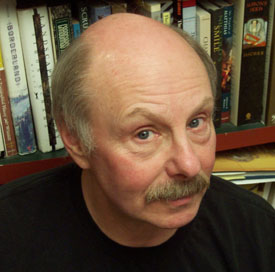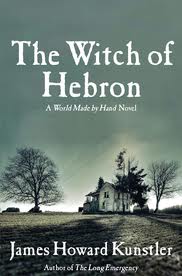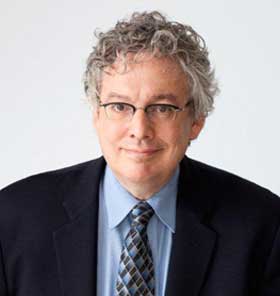James Howard Kunstler Reading from an Unpublished Novel
March 20, 2013 by David
Filed under AuthorsVoices
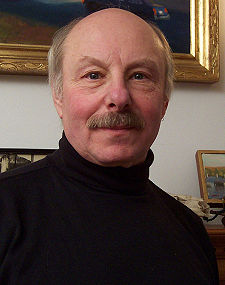 Genetically and biologically, we humans must still be heavily pre-literate, so the oral transmission of ideas, art and culture is powerful for us; we listen and concentrate on the words differently than we are used to doing when we consume written texts. I have always enjoyed hearing writers read their work. The author’s voice carries intonation and meaning that adds to the impact of the work and makes me feel closer to the writing.
Genetically and biologically, we humans must still be heavily pre-literate, so the oral transmission of ideas, art and culture is powerful for us; we listen and concentrate on the words differently than we are used to doing when we consume written texts. I have always enjoyed hearing writers read their work. The author’s voice carries intonation and meaning that adds to the impact of the work and makes me feel closer to the writing.
So it’s a great pleasure to feature one of my favorite writers, James Howard Kunstler, in the AuthorsVoices series here at Writerscast. Kunstler is the author of a long list of really interesting books. He started out as a novelist, publishing novels on a variety of topics and settings through the nineties, when he switched to publishing nonfiction books about social and geographical issues, focusing on the suburbanization of America for the most part. The in 2005, Grove Atlantic published his The Long Emergency, a brilliant and troubling book about climate change and the “converging catastrophes of the 21st Century.”
In February, 2011, I interviewed Jim about the post-apocalyptic World Made by Hand series of novels that are his imaginings of what life will be like in the world after the collapse he predicted in The Long Emergency. At that time, he had written and published two books in the series, World Made by Hand and The Witch of Hebron. That interview can be found here. The third book in the series is still in progress, and it is from that novel that Jim is reading in this recording.
Kunstler’s excellent and active website is here. He blogs weekly and always has something interesting to say. You can read about his newest book, Too Much Magic, here; this book tells us how and why the long emergency is already upon us. The world in the novels he imagines may get here sooner than we think.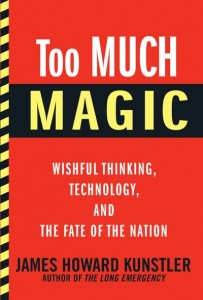
Podcast: Play in new window | Download
James Howard Kunstler: World Made by Hand
February 9, 2011 by David
Filed under Fiction, WritersCast
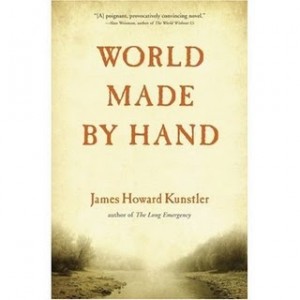 World Made by Hand – 978-0802144010 – paperback – Grove Press – $14.95 (e-book edition available)
World Made by Hand – 978-0802144010 – paperback – Grove Press – $14.95 (e-book edition available)
The Witch of Hebron: a World Made by Hand novel – 978-0802119612 – hardcover – Atlantic Monthly Press – $24.00 (e-book edition available)
This is an unusual podcast for me as it covers two books, World Made by Hand and the next in what looks to be at least a trilogy for author Kunstler, The Witch of Hebron. I had heard of, but never read any of Jim Kunstler’s books before these two, which I read much the way I read science fiction and fantasy novels when I was young, voraciously, entering and imaginatively inhabiting the world the author has created, joyfully, and always wanting more.
These two books are set in a fictional town in a real region of upstate New York, near the Hudson River, several hours north of Albany, in a period that Kunstler has dubbed The Long Emergency. That is the title of his most recent and best-selling work of nonfiction, a book I subsequently read and now believe is one of the most important books of our time.
In The Long Emergency, Kunstler describes why our current civilization is inevitably going to collapse. This is by no means a joyful prediction, but as his novels illustrate, the world ahead as we might imagine it, is not completely grim or devoid of joy and earthly human pleasure either. It is a post-fossil fuel world, and therefore much, much larger – humans do not travel thousands of miles in a day any longer. Governments have, for the most part, collapsed along with the great powerful corporations that have come to dominate our landscape. There is effectively no interstate commerce. Agriculture based on human and animal power is the dominant feature of daily life for most people.
There is a rise in human suffering, but a massive decline in human population, and during the period in which these novels are set, relatively soon after the collapse of modern civilization, there is a great deal of rediscovery of the tools and methods on which human life was built over the many centuries preceding the 21st. There are still many who remember how things were, and their beings are marked by what they knew, and lost, and now, as they are relearning how to live, by rediscovery of a different set of values. The younger generations know nothing directly of the world we now take for granted. Their lives have always been slower than ours, more physically challenging, and much more about adaptation to one’s direct physical environment. In addition to the daily necessities, it is personal relationships, family, community and local culture that this world revolves around. It is a world made by hand, and sometimes much rougher and more painful for being so, but there is a palpable sense of redemption and concern for what is good and right that underlies the world that Kunstler has imagined, that gives meaning to the struggles his characters must face throughout these two books.
Kunstler is a terrific writer and storyteller. These are fully imagined characters living in a plausible future. I can’t wait to read the next book in the series, and since it won’t be published for some time, I have been reading Kunstler’s older novels (most of which are sadly, out of print). When we talked, I had not read The Long Emergency, so our conversation is focused solely on the two novels which followed it. I’d recommend to anyone who has not read these books to start with the fiction as I did, and then go back to the nonfiction. It’s important for us to have an understanding of where we are headed, and I think it helps us to face the difficulties ahead if we can imagine ourselves into a better place, just as Jim Kunstler has done with A World Made by Hand and The Witch of Hebron.
Do visit Jim’s website, which continuously presents valuable information about where we are and what we can do about it. Make sure you take a side trip to the mini-site for these novels, which is a beautifully put together experience in and of itself. A great author biography here. We had a fantastic wide-ranging conversation about the novels, the world they are set in, and how these characters and their stories illustrate the future Kunstler has so beautifully imagined and portrayed.
Podcast: Play in new window | Download
Kevin Baker: The Fall of a Great American City: New York and the Urban Crisis of Affluence
January 28, 2020 by David
Filed under Non-Fiction, WritersCast
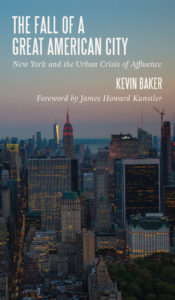 The Fall of a Great American City: New York and the Urban Crisis of Affluence – Kevin Baker (foreword by James Howard Kunstler) – 9781947951143 – City Point Press/Harper’s Magazine – Hardcover – 176 pages – October 8, 2019 – eBook editions available at lower prices.
The Fall of a Great American City: New York and the Urban Crisis of Affluence – Kevin Baker (foreword by James Howard Kunstler) – 9781947951143 – City Point Press/Harper’s Magazine – Hardcover – 176 pages – October 8, 2019 – eBook editions available at lower prices.
Kevin Baker has been one of my favorite writers for many years. He authored a wonderful baseball novel, Sometimes You See It Coming, based loosely on the life of Ty Cobb, but set in the modern day. I have read that book at least twice. Later, I was fortunate to work with Kevin on a project for the History Channel, and I have long appreciated his nonfiction history writing as well. When I read his essay in the July, 2018 issue of Harper’s Magazine, where Kevin often publishes on current affairs, called The Death of a Once Great City, I felt strongly that this story needed to be read as widely as possible. Kevin’s perceptive observations about New York City and its modern real estate-based problems, resonated with my own experience of the direction that modern American culture is moving. His piece seemed to me important enough to be made into a book.
Harper’s John MacArthur and Lynn Carlson agreed with my thinking, and together with Kevin, we worked out an arrangement for publication of an expanded and enhanced version of Kevin’s original essay to be published in book form by my imprint, City Point Press. I am very pleased to have been able to work with Kevin and Harper’s on what is now called The Fall of a Great American City: New York and the Urban Crisis of Affluence.
This is the story of what is happening today in New York City and in many other cities across America. It is about how the crisis of affluence is now driving out everything we love most about cities: small shops, decent restaurants, public space, street life, affordable apartments, responsive government, beauty, idiosyncrasy, each other. This is the story of how we came to lose so much—how the places we love most were turned over to land bankers, billionaires, the worst people in the world, and criminal landlords—and how we can – and must – begin to take them back.
I think this is an important story and hope my listeners will agree. I do not usually talk to writers about books I have published myself for Writerscast, as I do not want this podcast to be about the books I publish rather than the books I read. But in this case, since I came to this book through the original essay that I did read, I think it is meaningful to present my conversation with Kevin for your listening enjoyment.
Kevin is a terrific writer, and this book presents a strong case for rethinking our approach to modern urban life. New York, San Francisco, Los Angeles, Chicago, Boston, and many other cities are all suffering through the same sorts of real estate crises. I was not alone in being moved by Kevin’s piece in Harper’s – the magazine has reported that the original essay was one of the most read of all pieces it has ever published and has “gone viral” online to reach a vast audience.
This story affects us all and challenges us to rethink how we approach the public good.
Kevin Baker grew up in Rockport, Massachusetts, graduated from Columbia University in New York City in 1980, and since then has earned his living as a writer and editor. Dreamland, part of Baker’s New York‚ City of Fire trilogy was published in 1999, Paradise Alley issued in 2002, and the third and final volume of the trilogy, Strivers Row, was published in 2006. Kevin was the chief historical researcher on Harold Evans’ best–selling history, The American Century, published in 1999. He wrote the monthly “In the News” column for American Heritage magazine from 1998-2007, and has been published in the New York Times, the New Republic, Politico.com, New York magazine, the Washington Post, the Chicago Tribune, the Los Angeles Times, and of course, Harper’s magazine, among other publications. He is a 2017 Guggenheim Fellow for nonfiction. Kevin is married and lives in New York City.
You can purchase books featured on Writerscast from indie bookseller, RJ Julia. Buy The Fall of a Great American City here.
Visit Kevin Baker’s website here.
Visit City Point Press here.
Podcast: Play in new window | Download

